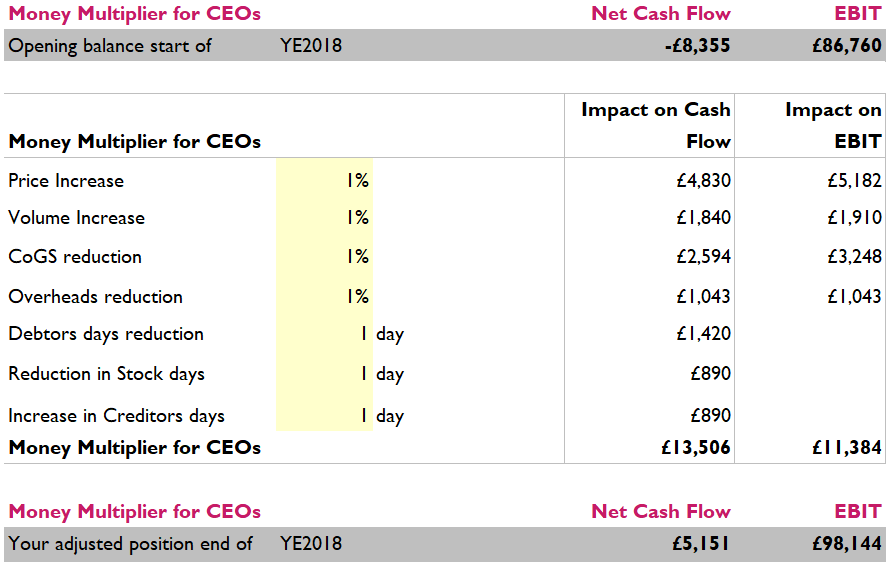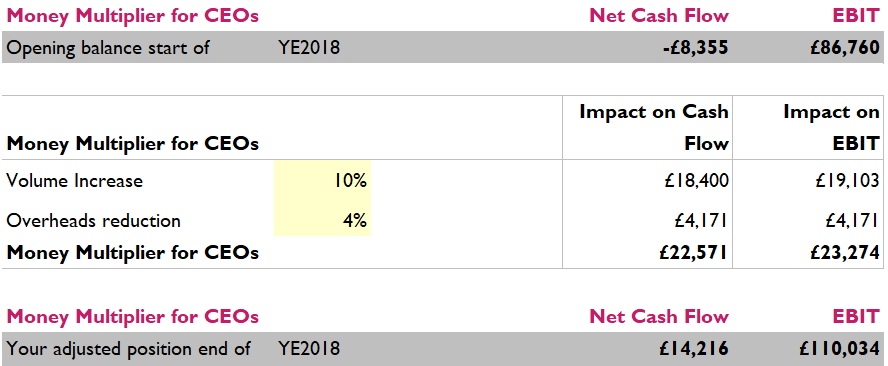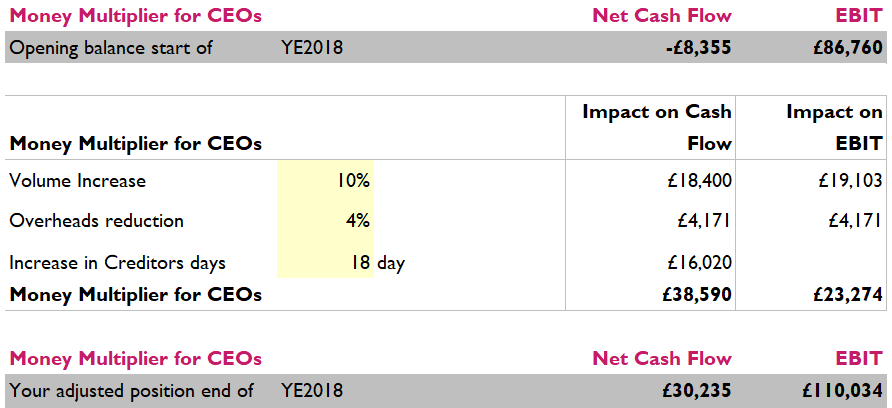Why your financial goals don’t seem to get completed? (and how to go about it)

Have you ever felt that you re-write a series of goals every few months? BUT every morning you wake up trying to make new configurations about making and spending money.
So your daily configurations are reactionary and driven by your operational needs – whereas financial goals are intentional and what you’d like to move forward to.
How do you tie these together and make your daily configurations move you towards the fulfilment of your financial goals?
Interestingly, it’s got nothing to do with motivation, ability or luck. There is actually a systemic reason why you aren’t achieving your goals.
It’s got nothing to do with belief. It’s got nothing to do with creativity, hard work or intelligence.
In this blog post, we can explore why you don’t seem to reach your financial goals – and, what to do about it.
New financial year, new goals!
The biggest mistake that CEOs make, when setting money goals, is making forecasts without setting any cash flow goals.
For some reason, our goal setting starts with sales projections and it ends there. At the beginning of the financial year, we look at the sales we’ve achieved in the last financial year and we add 50% on top – give or take. Sometimes we consider best case and worst case scenarios. And then we have numerous meetings about where the numbers will come from and plan our resources and what roles we need to recruit for. This is where the financial goal setting seems to end.
Cash flow does not seem to be an intentional goal; instead it is derived as a byproduct of your sales forecast, in the form of cash flow statement.
So it seems that every financial goal setting starts with your sales forecast and it ends with sales.
This has got nothing to do with prioritisation, or obligations. It happens to all of us, and unless we become more INTENTIONAL about our cash flow goals we are unlikely to see any results we’d hoped for with our financial goals.
It’s not going to change
When it comes to fulfilment of goals, the world isn’t changing. Whatever your goals are, you will experience the exact same roadblocks, problems and slow patches year in year out. No matter what your goals are, there will always be a reason and excuse not to achieve them.
So how do we get past those problems and roadblocks? It actually remarkably simple, but it does require commitment and developing new habits.
The good news is that it’s incredibly easy to do. The bad news is that you have to do it every day.
Eventually, it will become the first thing you do in the morning. And I guarantee, you will see a difference sooner than you had expected.
Use comparison for identifying your goals, not for fulfilling them
We have a tendency to compare our business to that of our competition.
BUT you need to let your competition do its work – help you identify, with greater clarity, what you want from your business. But once the idea has been born, never look back at the competition!
You could use your competition to goose up your desire for more money, see what is possible. This is the reason tech hubs are created, as they feed off each other and create more: one gets inspiration and the other business sees the achievements and want to do better and faster, etc., etc. You’ve seen what’s going on with innovation cities, haven’t you?
You should appreciate your competition for what they birth in you. BUT if you look back and you start looking at your competition, what they are doing, thinking too much, planning too much, your focus will be split in two and you will be holding yourself back and won’t be able to move forward to fulfil your goals.
Writing them out is a start
Once your ideas are born, which is the hardest part really, your financial goals are created. Some people prefer to write them down and some don’t.
While writing out your goals is a very important step. It’s not the ONLY step in achieving them, though.
Yes, this first step of writing goals is often very difficult for many people. What do I want and why do I want it and what is it like to have it? Forward looking, imagining, envisioning.
But it’s not as simple as then jumping from writing them out, to actually doing them.
It obviously doesn’t happen by accident or magic. But there does seem to be a missing link in achieving your goals.
And I believe that missing link is how we “remember” our goals.
How to set financial goals properly?
Stick to 1 main financial goal for the year.
Here’s the biggest piece, having too many goals means you’ll achieve none of them. People vastly overestimate what they can achieve in a year, and vastly underestimate what they can do in a lifetime.
Best thing to do is have one generic goal, such as financial balance, or achieving big financial goal or come out of a financial despair. And a number of sub goals which you could set annually or quarterly. These will help you move closer to your one generic goal, incrementally.
At BMIM Cash flow, we use our Money Multiplier for CEOs to help our clients turn their key generic financial goal into sub-goals, more specific and achievable. Here is how we do this:
We take the main generic goal and turn it into more specific and attainable sub-goals.
For example, our client wanted to achieve financial stability. The reason for this was that for a number of years before they’d been in financial distraction and mainly due to lack of interest by the CEO in doing something about it and focusing on what would change the situation.
So for anyone on the outside and even inside the business Financial Stability does not mean anything, really. It is too generic and vague. Therefore, we needed to find a way to make this goal more specific and break it down into sub-goals.
The true facts were that this company was making almost £10k cash flow loss annually. This means that the movement in their cash and debt balances was making a loss.
See, often CEOs pay attention to profit only when identifying goals, but it is the actual cash that matters most, as without it you will be unable to operate your business.
So to achieve financial stability we needed to bring the cash into balance.
Using our Money Multiplier for CEOs, we quickly explained to our client that we needed to identify and work on moving one or more of the drivers of cash (please see below). We presented the table below (these were created using our client’s financials) and we said, “….for every percentage change or every day change in these drivers, this is how much more money you are going to make.“

Our first question to our client was: “What is the easier driver to change?”
They said, “Overheads! We can cut our overheads by 4% if we make these small changes here”, they said.
“Great!” we said, “Let’s see what this change is going to do to your business.” So we entered 4% in the overhead section of our tool and we saw that this reduction to make £4,171!

This still was not going to solve the problem fully, so we continued to encourage the CEO to think of other avenues to improve their cash flow position. They were not sure if they were going to be able to achieve the newly projected sales, in its entirety, but they knew that they could easily sell at least 10% more than what they were currently selling, and that is without any clever strategy, just a pure desire to sell more.

Then we said to our client. “Let’s see if we could increase the creditors’ days”. How often do you pay your creditors? They said, “When invoices are due”. “And how long have you worked with your creditors?” we asked. They said “for a number of years.”
We took the creditors list and made a plan for payment runs and we asked our client to inform their supplier of the newly implemented payment runs. This change was going to increase the creditors’ days by 18 days making £16,020 in cash!
 So we made these 3 sub-goals the main focus for our client.
So we made these 3 sub-goals the main focus for our client.
Track the progress you are making
Staying focused on your goals is a prerequisite to their achievement. So whatever specific sub-goals you’ve set, make sure to track their progress.
The frequency of the tracking depends on how quickly your business is moving. Most businesses should track the progress of their cash flow quarterly, unless your business moves really fast, in which case we would recommend monthly meetings to track your progress.
At these goal progress meetings, make sure to stay open to other opportunities or threats that might be coming your way that will impact your main financial goal.
For example, our client was threatened by one of their main supplier to increase the prices by 6%. This was going to impact the cash flow adversely by -£15,561. And even though our client was still going to achieve their financial stability, with or without this “surprise” we encouraged them to negotiate the time of change, whilst looking for an alternative supplier.
Rewrite your goals every morning
This is the first major thing that successful people repeatedly do with their goals.
They rewrite their goals, in their notebook, every single morning and every single evening. They visualise how they want things to be. They envision the benefits they are going to experience as a result of the fulfilment of their main financial goal.
Eventually, after writing it daily, every single day for the rest of your life, you would either come to belie it or abandon it altogether.
This is what we call self-actualisation.
And the more you believe it, the more you will find ways to fulfil it.
You can’t truly believe that you can achieve a goal, until you have really internally digested and you feel it being really close. Sometimes this takes longer than you might think.
Just because you want a goal and you understand the merits of achieving it, does not mean you truly believe you’re capable of reaching it.
The biggest change I made to my life, when it came to writing out and executing goals, was rewriting them every single day.
The first thing I did when I woke up was to rewrite my goals, from a new, refreshed position.
I’ll rewrite the same financial goal over and over and over, until I’ve achieved it.
Not just into I believe it, but until I’ve achieved it!
Interestingly, for the first week or two weeks, it looks like you are rewriting the same thing over and over. But eventually, you will make subtle changes to your goals. You will learn to write them in a more positive way, as you write them you’ll understand what is important about the goal and what you should focus on.
Someone who rewrites their goals daily will have a very different perspective on that goal, six months after their first attempt at writing it.
It’s vital that you rewrite your goals daily, in order for you to truly internalise the goal.
It’s also the easiest way to remind yourself what to focus on every day. Your focus will certainly create atmosphere for others to help you achieve your goals, also. People on your team, people you are working with, your customers etc.
Make sure you can understand and explain “why”
As you are rewriting your goals, and as you are rereading them and internalising them, challenge yourself on the goals and ask yourself “why is this important to me?”
Jim Rohn says “the reason for the house, is stronger than the house”. The reason why you want to own a larger house is a stronger motivator, than just owning a nice house. The difference between wanting to impress your neighbours, and wanting to give an individual bedroom to your two new children, is a vastly different motivator.
If you can truly understand, explain and even justify your “why”, every single time you reread your goals, your motivation will be much stronger. And you will come to a greater understanding of the essence of this goal and why it is important to you and your business.
It can’t be this easy?
Honestly? It is. It’s very easy to do. The problem is that it’s easy to not do also. It’s hard to consistently write your goals, envision, internalise. But it is worth it.
And when you are ready to move forward with the fulfilment of your financial goal, you can start becoming more specific. You can use the Money Multiplier for CEOs to translate your main goal into more specific sub-goals to bring yourself closer to your main goal and its achievement.
You money goals should be about cash flow. Focusing your attention on revenue solely will not change your financial situation unless you translate your financial goals into cash. You can download the Money Multiplier for CEOs below to do the work for you. Good luck!









